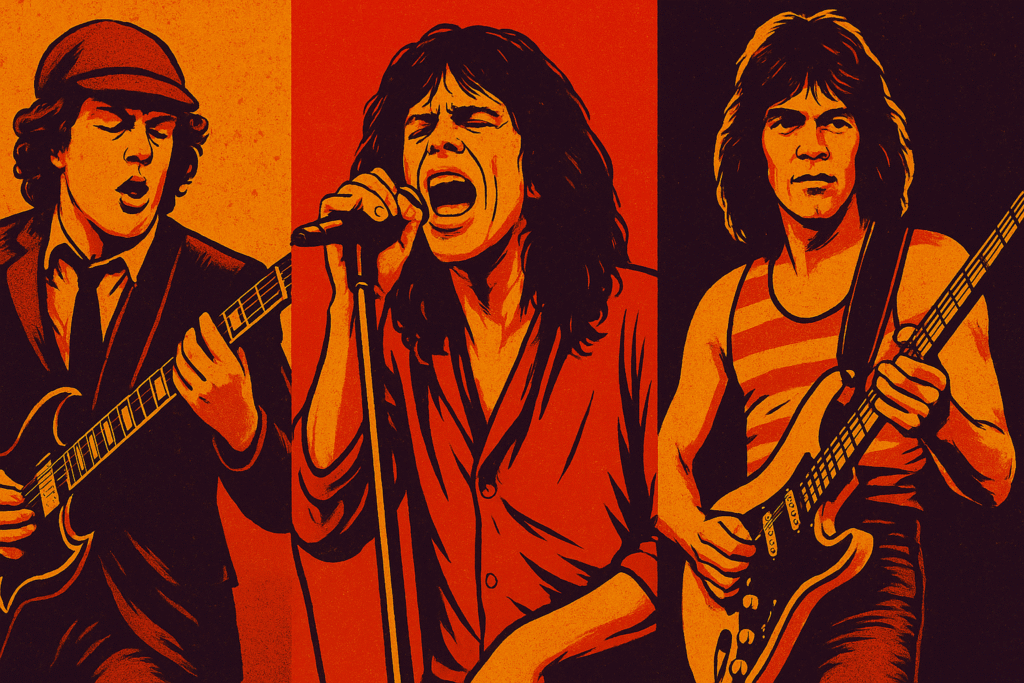
AI-generated image for illustrative purposes.
Ever notice how ’70s Hard Rock hits like a sucker punch? While some bands were drifting into psychedelic trips and prog rock was stretching horizons with 20-minute suites, Hard Rock emerged as the raw alternative: straight to the point, electric, and unapologetic. AC/DC, Aerosmith, and Van Halen weren’t concerned with music theory or cosmic journeys — they wanted to set stages on fire, break conventions, and turn every riff into a manifesto.
The Fertile Ground of Hard Rock
The ’70s were a pressure cooker: the hangover from Woodstock, the explosion of heavy metal, and the rise of pop culture that turned music into a shelf-ready product. In that chaos, Hard Rock came roaring as the raw, noisy response — no frills, no contemplation, just sharp guitars, pounding drums, and lyrics about sex, addiction, partying, and rebellion.
AC/DC: The Australian Locomotive
Formed by brothers Angus and Malcolm Young in 1973, AC/DC never hid its intentions: to make noise that was simple, direct, and relentless. Angus’s school uniform became an icon, but the real weapon was his guitar riff — like a jackhammer fueled by cheap whiskey.
Albums like High Voltage (1975) and Highway to Hell (1979) cemented their raw, electrifying, and downright addictive sound. They didn’t need to reinvent the wheel — just spin it at full speed over anyone daring to doubt them.
Aerosmith: America’s Stones?
While AC/DC was igniting Australia, America found its voice in Aerosmith, the ultimate dealers of Hard Rock’s sleaze and glamour. Steven Tyler and Joe Perry became the “Toxic Twins”: sex, drugs, and an onstage chemistry as explosive as Jagger and Richards.
Albums like Toys in the Attic (1975) and Rocks (1976) are pure Hard Rock scripture — unforgettable riffs, sticky choruses, and a wild spectacle of lust that seduced and scandalized in equal measure. Aerosmith didn’t just want to play loud; they wanted to turn every show into a chaotic spectacle of decadence.
Van Halen: Reinvention at the Decade’s End
If AC/DC was brute force and Aerosmith decadent swagger, Van Halen burst onto the scene in 1978 with virtuosity and spectacle. Eddie Van Halen reinvented the electric guitar with his tapping technique, unlocking a sonic universe that would dominate the ’80s.
Frontman David Lee Roth was the embodiment of cocky showmanship, a master of turning any stage into a circus. Their debut, Van Halen (1978), was a thunderbolt that mixed power, party vibes, and technical innovation. “Eruption” became the anthem for every guitarist who thought they knew how to play — until Eddie proved otherwise.
Rebellion in Three Acts
’70s Hard Rock wasn’t just music — it was attitude. AC/DC showed that simplicity could be devastating. Aerosmith shoved America’s own glamorous decay back in its face. And Van Halen proved virtuosity could be explosive without losing the party spirit. Three faces of the same beast, three ways to say it loud: rock isn’t about being polished, it’s about shaking people up.
Straight to the Gut
’70s Hard Rock was never meant to be polite. It was noise, sweat, and rebellion in its rawest state. AC/DC proved three chords could build an indestructible sonic wall. Aerosmith put America’s decadent glamor on display, turning excess into fuel for rock. And Van Halen proved technique could blow the roof off — Eddie rewrote the guitar playbook without ever losing the fun. Together, these bands sent a message loud and clear: rock only makes sense when it defies and leaves a mark.
Burning Questions
Is Hard Rock the same as Heavy Metal?
No. Hard Rock was rooted more in blues and the party vibe, while Heavy Metal pushed directly toward aggression and sheer heaviness.
Was Aerosmith really just a “Stones copy”?
An inevitable but unfair comparison. Aerosmith had more urban poison and less of the British R&B influence.
Can Van Halen be called the “father” of ’80s metal?
Absolutely. Without Eddie, much of the glam metal scene in the ’80s wouldn’t exist.
Did AC/DC change rock?
They didn’t invent anything new, but they proved that simplicity can be unstoppable.
— Tyler Wolf, Rock Vaults
